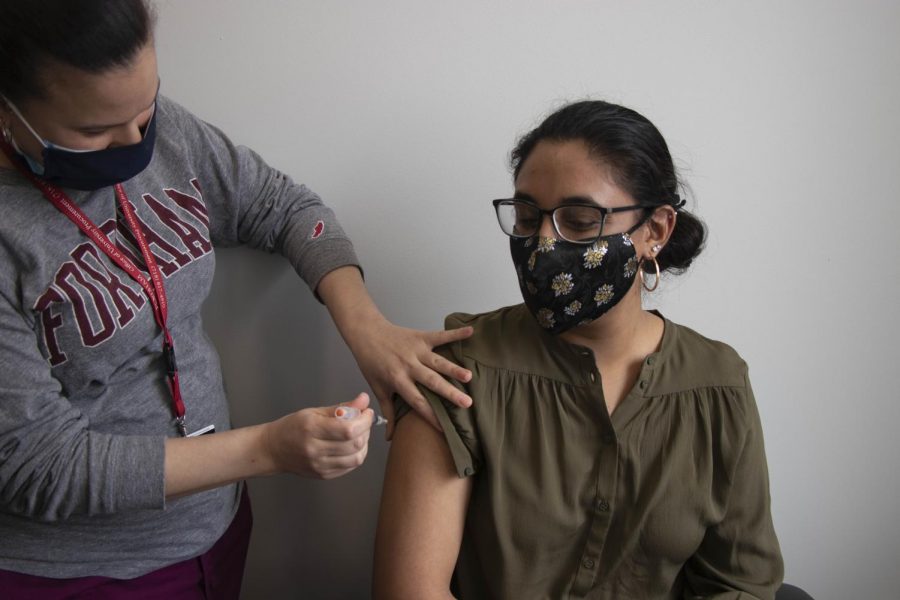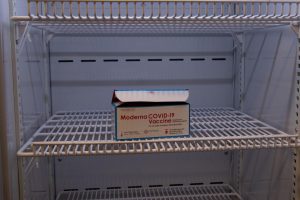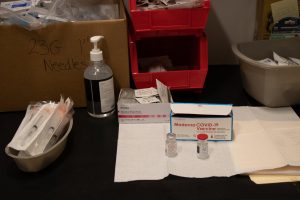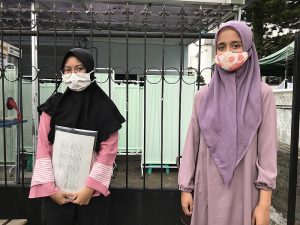How the Vaccine Could Impact Your Period
The jury’s still out on whether the COVID-19 vaccine affects the menstrual cycle
Limited research has left many with few answers on the impact of the COVID-19 vaccines on the menstrual cycle.
May 25, 2021
The vaccines that protect against COVID-19 have been the target of several recent social media posts claiming that merely being in the vicinity of a person who is vaccinated can harm reproductive health. This is patently untrue, as the side effects of the vaccine cannot be transmitted to someone else. However, such baseless rumors can spread when there is little scientific research to point to, as is the case with the potential impact of the coronavirus vaccine on the menstrual cycle.
Following vaccination, some Fordham students have reported experiencing abnormal menstrual cycles, with symptoms ranging from excruciating pain to sudden appearances of menstruation despite hormonal medication. In the broader population, some people have had significantly lighter periods, while others have experienced much heavier ones; some have even reported getting their period for the first time in a while, while others have seen a noticeable delay.
Trina Stewart, FCLC ’23, takes medication to skip her menstrual cycle for health reasons and was faced with a sudden reappearance of her period for the first time in three years following her shot. Others, like Evelyn Sims, FCLC ’23, experienced vaccine side effects such as aches, chills and exhaustion, but had no period abnormalities at all.
Post-vaccine surveys are now being regularly administered to gauge the side effects experienced by a wide range of vaccine recipients, but few ask participants about whether their menstrual cycle has changed following the vaccine.
One abnormal period is probably nothing to worry about — there is really only cause for concern if several cycles are unusual. However, the lack of research into potential effects of the vaccine on the menstrual cycle, even after numerous accounts of abnormal menstrual cycles post-vaccination, is a testament to the consistent neglect of health concerns primarily impacting women and people who menstruate.
Post-vaccine surveys are now being regularly administered to gauge the side effects experienced by a wide range of vaccine recipients, but few ask participants about whether their menstrual cycle has changed following the vaccine. The official tool provided by the Centers for Disease Control and Prevention (CDC) to track vaccine side effects fails to provide users an opportunity to record any abnormalities in their menstrual cycle.
“The form I had to fill out when I got the vaccine essentially just asked if I had cancer or any other kind of terminal illnesses,” Sims said. “Although I understand they can’t test every last health condition people have, things such as menstruation seem to be one of many missed tests.” Vaccine trials conducted prior to distribution also did not thoroughly investigate the potential impacts of the vaccine on the recipients’ menstrual cycles. Although development of the vaccine was undoubtedly a time-sensitive matter, reproductive health was barely taken into consideration.
Insufficient research about any connection between menstruation and the vaccine has translated into news coverage announcing no link between the vaccine and an abnormal menstrual cycle. While those headlines are technically true, readers must take into consideration that there is not yet substantial evidence from which to draw clear conclusions.
This type of coverage has led to confusion over whether the demonstrated abnormalities in vaccine recipients’ periods are indeed related to the vaccine, and many have expressed concern over the absence of research with regard to such a crucial aspect of health for half the world’s population. Kamila Vahidi, FCLC ’23, felt that it was a worrisome omission, wondering, “How do you completely overlook that? How do you release any vaccine or drug without investigating its effects on every part of the body?”
Amid plentiful warnings about other side effects from the vaccine, no warning was provided about the possibility of an abnormal menstrual cycle. Faced with sudden changes to their period, some were unexpectedly overwhelmed with side effects, while others worried they were dealing with an urgent medical issue. With regard to the lack of guidance, Stewart said, “I really wish they told us, because at least I could be prepared and wouldn’t have to worry about whether my medication had stopped working.”
Merely sharing anecdotes on social media has been a deeply unreliable way to detect and address medical concerns, pointing to the necessity of investigating the issue in a more official and reputable way.
The lack of attention to the issue has also drawn criticism of the medical field at large, given the perennial disregard for women’s issues in the medical and scientific fields, which have historically been dominated by men. Health concerns primarily experienced by women have often been overlooked, such as in HIV vaccine and treatment trials. HIV tests have long failed to include women, despite the fact that women account for just over half of HIV patients, resulting in insufficient information about the impact of potentially life-saving cures on women’s bodies.
There is a noted difference between the female and male immune systems, requiring different methods of study, but men’s health has repeatedly been prioritized. For years, the general consensus in medicine has been that “the female body would ruin the research” due to fluctuating hormones that would add too many variables, until a law was passed in the 1990s requiring women to be studied in medical trials.
Vahidi remarked that this oversight means that women do not have adequate information to make informed decisions regarding their own health, lamenting that “it is deeply painful to know that women are not allowed to be in control of their bodies.”
Currently, researchers do not anticipate finding any critical reproductive health issues with the vaccine.
Because of the scarcity of concrete evidence, people are crowdsourcing their information about the issue. A Twitter thread prompted many to make a connection between their vaccination and an abnormal period, with users expressing vindication in the comments while being surrounded by accounts similar to their own. Merely sharing anecdotes on social media has been a deeply unreliable way to detect and address medical concerns, pointing to the necessity of investigating the issue in a more official and reputable way.
Two researchers are working to do just that. A study from the University of Illinois Urbana-Champaign is asking volunteers to describe their periods post-vaccine. So far, the researchers have hypothesized that the vaccine can temporarily kill the blood cells that make clotting possible, which could result in a heavier blood flow. Other medical professionals have postulated that the hormone signals which regulate the menstrual cycle could be disrupted by the presence of a vaccine.
Currently, researchers do not anticipate finding any critical reproductive health issues with the vaccine. The objective of this menstrual cycle research seems to be mostly a confirmation that these experiences are neither random nor isolated. Even if a connection between vaccination and temporary abnormal menstruation is found, it is highly unlikely that the vaccines are harmful to fertility, and it is certainly not a reason to avoid being vaccinated. According to Dr. Anthony Fauci, the White House chief medical advisor, 8% of Americans who received the first shot are already skipping their second dose, afraid of the more well-known side effects of fever and exhaustion.
Although it is important to remain attentive to any side effects, medical professionals are warning that skipping any part of the vaccination process provides much less protection. While waiting for more conclusive evidence to be gathered, it’s best to simply be mindful of both your own experience and of developing research, and perhaps try to avoid scheduling your vaccine appointment near your period.















